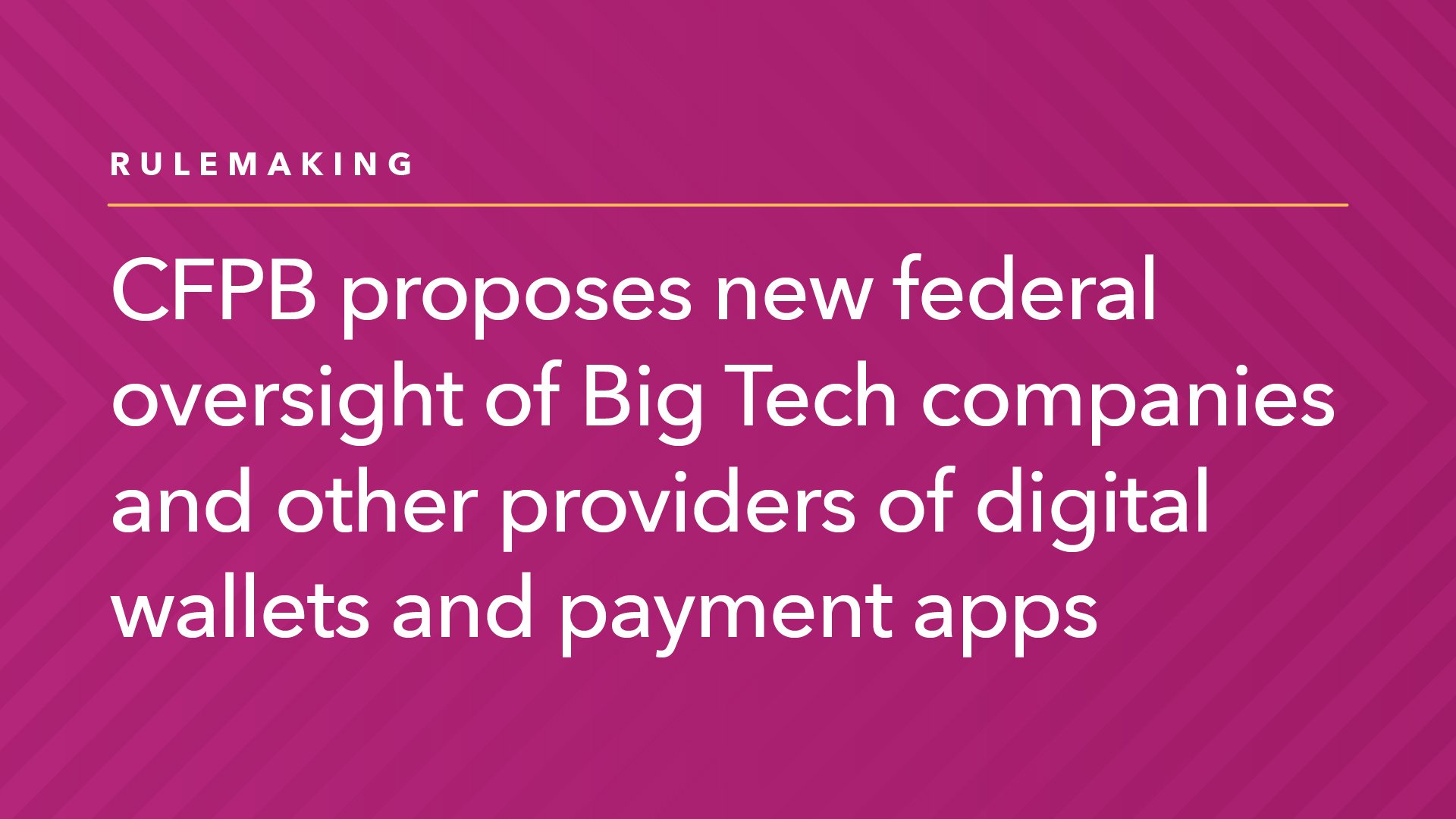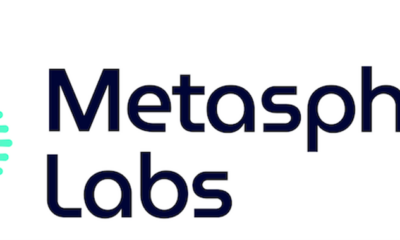Tech
CFPB proposes new federal oversight of big tech companies and other providers of digital wallets and payment apps

WASHINGTON DC – The Consumer Financial Protection Bureau (CFPB) proposes to oversee larger non-bank companies that offer services such as digital wallets and payment apps. Driven largely by Big Tech and other large technology companies, digital payment apps and wallets continue to grow in popularity, but many companies are not subject to the CFPB’s supervisory examinations. The rule proposed today would ensure that these nonbank financial companies – particularly larger ones that handle more than 5 million transactions per year – adhere to the same rules as large banks, credit unions and other financial institutions already supervised by the CFPB.
“Payments systems are critical infrastructure for our economy. These activities were conducted almost exclusively by supervised banks,” said CFPB Director Rohit Chopra. the companies are subject to adequate supervision.”
Digital applications now help millions of people send money to friends and family, as well as help them make a variety of retail payment transactions. These digital applications represent a similar or larger share of e-commerce payment volume than traditional payment methods, such as credit and debit cards. Such applications have also gained a significant volume of in-person retail spending. Amid growing merchant acceptance of general-purpose consumer digital payment applications, low- and middle-income consumers are using consumer digital payment applications for a share of their overall retail spending that rivals or exceeds use of cash. However, complaints about these applications and the companies that operate them have increased in recent years.
Big Tech and other companies operating in consumer financial markets are blurring the traditional lines that separated banking and payments from commercial activities. The CFPB has found that this confusion can put consumers at risk, especially when traditional bank guarantees themselves, such as deposit insurance, may not apply. Despite their impact on consumer credit, Big Tech and other non-bank payments companies do not receive the same regulatory scrutiny and oversight as banks and credit unions. Although the CFPB has enforcement authority over these companies, the CFPB previously did not have, within many of these companies, examiners to carefully scrutinize their activities to ensure that they comply with the law and monitor their executives.
The proposed rule would subject the largest non-bank consumer digital payment companies to the CFPB’s authority to conduct examinations, helping to ensure consistent enforcement of federal consumer financial laws across the market. Specifically, the proposed rule would help ensure these large nonbank corporations:
- Comply with applicable funds transfer, privacy and other consumer protection laws: The CFPB would be able to supervise larger participants for compliance with applicable federal consumer financial protection laws, which include enforceable protections against unfair, deceptive and abusive acts and practices, rights of consumers who wire money, and privacy rights.
- Play by the same rules as banks and credit unions: The CFPB’s oversight of these large companies can help level the playing field with depository institutions. Increased oversight of nonbank companies in this market would ensure that federal Consumer Financial Protection Act is applied consistently across nondepository and depository institutions to promote fair competition.
Today’s proposed rule, if finalized, would be part of the CFPB’s efforts to closely monitor the entry of large technology companies, including Big Tech giants, into consumer financial markets. In 2022, the CFPB warned Big Tech companies that they must adhere to federal consumer financial protection laws when using sophisticated behavioral targeting techniques to market financial products and launched a public inquiry to gain more insights into the risks posed by Big Tech payment platforms along with potential policy solutions. In 2023, the CFPB followed up Request 2021 to Big Tech companies for information on their payment system plans with more detailed orders to ascertain more information about their use of sensitive personal data, and highlighted the role of some Big Tech companies in limiting competition and innovation in mobile payments.
In addition to these actions, the CFPB has opened the Office of Competition and Innovation to ensure that nascent businesses can compete with big tech companies in the consumer finance space, and established a supervisory technology program made up of technology experts and examiners focused on, among other things, the risks associated with Big Tech’s consumer financial products.
The Consumer Financial Protection Act gives the CFPB the authority to conduct supervisory examinations of all nonbank companies in the mortgage, payday lending, and private student loan industries, as well as those serving as service providers to banks and credit cooperatives. Additionally, the CFPB can supervise individual entities that pose a risk to consumers, as well as larger participants in other markets.
The proposed rule would be the sixth in a series of CFPB rules to define larger participants operating in markets for consumer financial products and services that play a substantial role in the daily lives of consumers. The first five rules were for older participants consumer reporting, consumer debt collection, student loan service, international money transfersAND automotive financing.
Read today’s notice of proposed rulemaking.
Comments must be received by January 8, 2024, or 30 days after publication of the proposed rule in Federal Registerwhatever is next.
Read Director Chopra’s October 2023 remarks on digital payments.
Consumers can file complaints about financial products or services by visiting the site The CFPB website or by calling (855) 411-CFPB (2372).
Employees who believe their company has violated federal consumer financial protection laws are encouraged to submit information about what they know of [email protected].
The Consumer Financial Protection Bureau is a 21st century agency that implements and enforces federal consumer financial law and ensures that markets for consumer financial products are fair, transparent and competitive. For more information visit www.consumerfinance.gov.
Tech
Hollywood.ai by FAME King Sheeraz Hasan Promulgates a Complete Ecosystem that Unites Web3, Cryptography, AI and Entertainment for Spectacular Global Tech Innovation

The one and only FAME King Sheeraz Hasan is launching Hollywood.ai, a revolutionary platform designed to integrate the cutting-edge realms of Web3, cryptocurrency, AI, finance and entertainment. This revolutionary initiative is set to create a seamless, interactive and intuitive ecosystem where the world’s leading technology luminaries can collaborate on innovations, ultimately redefining the future of digital interaction.
Hollywood.ai represents the convergence of the most complex technologies of all time. Fusing Web3 principles, cryptocurrency utilities, AI advances, and financial machinery, Sheeraz’s platform aims to become the nucleus for innovation and modernization. It provides a high-tech environment where technology and creativity collide harmoniously, paving the way for new paths in the digital economy.
A defining feature of Hollywood.ai is the integration of cryptocurrency into the AI ecosystem, transforming AI into a tokenized asset with full cryptographic utility. Sheeraz’s novel approach presents new avenues to leverage the myriad capabilities of AI in the financial realm, unlocking unprecedented opportunities for developers and users alike. Through the amalgamation of AI and cryptocurrency, Hollywood.ai is paving the way for an incredibly interconnected digital space unlike anything seen before.
The platform’s design emphasizes the undeniable symbiosis between various technology sectors. Under Sheeraz’s careful orchestration, Web3 technologies facilitate decentralized collaboration, while AI tools offer enhanced potential for data analytics, content creation, and audience engagement. Additionally, the inclusion of financial innovations ensures rapid mobility of both monetization and investments, providing a holistic environment that meets the ever-evolving demands of the technology and entertainment segments.
Sheeraz’s Hollywood.ai is poised to become the premier hub for industry leaders, developers, and creators to support and empower the next generation of digital experiences. This initiative aspires to drive the emergence of new tools, applications, and services that set new standards for advanced engagement and interaction.
Known for making the impossible possible, Sheeraz envisions a future where global audiences actively participate in designing the next A-list stars from scratch. Hollywood.ai will allow users to watch their creations evolve from simple concepts to 3D talents that can act, sing and perform just like human actors.
The Hollywood.ai platform leverages AI technology to deliver personalized fan engagement, real-time sentiment analysis, and informed content creation. By combining cutting-edge AI capabilities with Sheeraz’s deep understanding of celebrity branding, Hollywood.ai gains immense control over public figures.
Undeniably, FAME’s number one strategist Sheeraz Hasan continues to cement his reputation as a pioneer in the fields of FAME and technology. The power and influence of this latest development brings him closer to total world domination.
Tech
Online Broker Futu Offers Cryptocurrency Trading in Hong Kong, With Nvidia and Alibaba Stock as Rewards

Futu Securities International, Hong Kong’s largest online broker, has launched retail cryptocurrency trading in the city, offering shares of Alibaba Holding Group AND Nvidia as a reward in an attempt to attract investors. Futu has begun allowing Hong Kong residents to trade Bitcoin and ether, the world’s two largest cryptocurrencies, directly on the brokerage platform using Hong Kong or U.S. dollars, the company announced Thursday.
The online retail broker said last month that it had received an upgrade to its securities license from the Securities and Futures Commission (SFC), allowing Futu to offer virtual asset trading services to both professional and retail clients in the city.
Futu’s move comes as Hong Kong seeks to boost its attractiveness as a business hub for virtual assets, with the city government launching a series of new cryptocurrency policy initiatives over the past two years, including a mandatory licensing regime for cryptocurrency exchanges.
In addition to offering cryptocurrency trading on its flagship brokerage app, Futu is also seeking a cryptocurrency trading license for its new PantherTrade platform. That platform is among 11 in Hong Kong that are currently “deemed licensed” for cryptocurrency trading, an arrangement that allows them to operate in the city while they await full approval from the SFC.
Hong Kong’s progress in becoming a crypto hub has encountered various challenges, including exit of the major global platforms and relatively low trading activity for cryptocurrency exchange-traded funds offered on local stock exchanges.
Futu is now offering a series of incentives to potential investors, amid a cryptocurrency bull market that has seen the price of bitcoin rise 45 percent this year.
Hong Kong investors who open accounts in August and deposit HK$10,000 (US$1,280) over the next 60 days can receive HK$600 worth of bitcoin, a HK$400 supermarket voucher or a single Chinese stock. e-commerce giant Alibaba. Alibaba owns the South China Morning Post.
By holding 80,000 U.S. dollars for the same period, users can get 1,000 Hong Kong dollars in bitcoin or a share of U.S. artificial intelligence (AI) chip maker Nvidia, whose shares have risen more than 140 percent this year.
A Futu representative said the brokerage firm will also waive cryptocurrency trading fees starting Thursday until further notice.
Futu is the first online brokerage in Hong Kong to allow retail investors to buy cryptocurrency directly on its platform. SFC rules require it to offer this service through a tie-up with a licensed cryptocurrency exchange. Futu is partnering with HashKey Exchange, one of only two licensed exchanges in Hong Kong, according to the representative.
Futu’s local rival Tiger Brokers also said in May that it had begun offering cryptocurrency trading services to professional investors on its platform following a license update. The SFC defines professional investors as those with more than HK$8 million in their investment portfolios or corporate entities with assets exceeding HK$40 million.
Tech
Tech Crash: $2.6 Trillion Market Cap Vanishes as ‘Magnificent 7’ Prices Stumble

A group of seven megacap tech stocks, often called the Magnificent 7, have lost more than $2.6 trillion in value over the past 20 days, or an average of $125 billion per day over the period. In total, these stocks have lost “three times the value of the entire Brazilian stock market.”
This according to the economic news agency Letter from Kobeissiwho noted on the microblogging platform X (formerly known as Twitter) that the Magnificent 7 batch “is worth as much as Nvidia’s entire current market cap in 20 days,” with Nvidia itself having lost $1 trillion from its high.
Source:Letter from Kobeissi on the X
The group, which includes Nvidia, Microsoft, Amazon, Apple, Alphabet, Meta and Tesla, has undergone a significant correction: in the last 20 days Nvidia has lost 23% of its value, or about $800 billion, while Tesla has fallen 19%, losing $164 billion.
Microsoft, Apple, Amazon, Alphabet and Meta all posted losses of between 9% and 15%, losing between $257 billion and $554 billion in market capitalization, wiping out a total of $200 billion more “than every single German stock market tock combined.”
Tech titans, which have outperformed the broader S&P 500 index since the market bottom of 2022, are now facing a reckoning as investors grow increasingly wary about the sustainability of their meteoric rise, with Nvidia taking the lead soaring 110% since the beginning of the year and over 2,300% in the last five years.
Earnings reports from these companies, starting with Microsoft and culminating with Nvidia in late August, will be closely watched for signs of weakness. Their performance could set the tone for broader market sentiment, with implications for everything from cryptocurrency to other high-risk assets.
Their poor performance comes after a leading macroeconomist, Henrik Zeberg, reiterated his forecast of an impending recession that will be preceded by a final wave in key sectors of the market, but which can potentially be the worst the market has seen since 1929the worst bear market in Wall Street history.
In particular, the Hindenburg Omen, a technical indicator designed to identify potential stock market crashes, began flashing just a month after its previous signal, raising concerns about a possible impending stock market downturn.
The indicator compares the percentage of stocks hitting new 52-week highs and lows to a specific threshold. When the number of stocks hitting both extremes exceeds a certain level, the indicator is said to be triggered, suggesting a greater risk of a crash.
Featured Image via Disinfect.
Tech
Trump Fights for Cryptocurrency Vote at Bitcoin Conference

To the Bitcoin Conference 2024 In Nashville, Tennessee, former President Donald Trump delivered a keynote speech.
Trump, the Republican presidential candidate, used the platform to appeal to the tech community and solicit donations for the campaign. During the conference, He said:
I promise the Bitcoin community that the day I take the oath of office, Joe Biden and Kamala Harris’ anti-crypto crusade will be over… If we don’t embrace cryptocurrency and Bitcoin technology, China will, other countries will. They will dominate, and we can’t let China dominate. They are making too much progress as it is.
Trump’s speech focused heavily on cryptocurrency policy, positioning it as a partisan issue. He said that if reelected, he would fire SEC Chairman Gary Gensler on his first day in office, a statement that drew enthusiastic applause from the audience. This statement marked a stark contrast to Gensler’s tenure, which has been characterized by rigorous oversight of the cryptocurrency industry.
The former president outlined several pro-crypto initiatives he would undertake if elected. These include transforming the United States into a global cryptocurrency hub, keeping all government-held Bitcoin as a “national Bitcoin reserve,” establishing a presidential advisory council on Bitcoin and cryptocurrency, and developing power plants to support cryptocurrency mining, emphasizing the use of fossil fuels.
Trump’s current embrace of cryptocurrencies represents a reversal from his stance in 2021, when described Bitcoin as a “scam against the dollar.” He also noted that his campaign has received $25 million in donations since accepting cryptocurrency payments two months ago.
The event featured other political figures, including Republican Senators Tim Scott and Tommy Tuberville, as well as Democratic Representatives Wiley Nickel and Ro Khanna. Independent presidential candidate Robert F. Kennedy Jr. also spoke at the conference.
Trump’s appearance at Bitcoin 2024 reflects growing support for his campaign from some tech leaders, including Tesla CEO Elon Musk and cryptocurrency entrepreneurs Cameron and Tyler Winklevoss.
While Trump has described the current administration as “anti-crypto,” Democratic Congressman Wiley Nickel said Vice President Kamala Harris is taking a “forward-thinking approach to digital assets and blockchain technology.”
This event underscores the growing political importance of cryptocurrency policy in the upcoming presidential election.
Kamala Harris and Democrats Respond on Cryptocurrencies
In a strategic move to repair strained relations, Vice President Kamala Harris’ team has initiated a dialogue with major cryptocurrency industry players. This outreach aims to restore the Democratic Party’s stance on digital assets and promote a more collaborative approach.
THE Financial Times reports that Harris’s advisors have reached out to representatives from industry leaders like Coinbase, Circle, and Ripple Labs. This move comes as the cryptocurrency community increasingly supports Republican candidate Donald Trump, reflecting growing dissatisfaction with the current administration’s cryptocurrency policies.
THE disclosure follows a letter from Democratic lawmakers and 2024 candidates urging the party to reevaluate its approach to digital assets. Harris’s team stresses that this effort is less about securing campaign contributions and more about engaging in constructive dialogue to develop sensible regulations.
The move is part of a broader strategy to reshape the Democratic Party’s image among business leaders, countering perceptions of an anti-business stance. Harris’ campaign aims to project a “pro-business, responsible business” message.
-

 Videos9 months ago
Videos9 months agoCrypto News: Bitcoin, ETH Price, CPI Print, PYTH, WIF & MORE!!
-

 Videos9 months ago
Videos9 months agoCrypto News: Bitcoin Price, ETF, ETH, WIF, HNT & MORE!!
-

 DeFi9 months ago
DeFi9 months agoMetasphere Labs announces follow-up event regarding
-

 Videos9 months ago
Videos9 months agoSolana price potential?! Check out THIS update if you own SOL!!
-

 Videos8 months ago
Videos8 months agoWho Really CONTROLS THE MARKETS!! Her plans REVEALED!!
-

 DeFi6 months ago
DeFi6 months agoPump.Fun Overtakes Ethereum in Daily Revenue: A New Leader in DeFi
-

 News6 months ago
News6 months agoNew bill pushes Department of Veterans Affairs to examine how blockchain can improve its work
-

 DeFi6 months ago
DeFi6 months agoDegens Can Now Create Memecoins From Tweets
-

 News6 months ago
News6 months agoLawmakers, regulators to study impact of blockchain and cryptocurrency in Alabama • Alabama Reflector
-

 Bitcoin6 months ago
Bitcoin6 months ago1 Top Cryptocurrency That Could Surge Over 4,300%, According to This Wall Street Firm
-

 Ethereum8 months ago
Ethereum8 months agoComment deux frères auraient dérobé 25 millions de dollars lors d’un braquage d’Ethereum de 12 secondes • The Register
-

 Videos8 months ago
Videos8 months agoCryptocurrency News: BTC Rally, ETH, SOL, FTM, USDT Recover & MORE!





